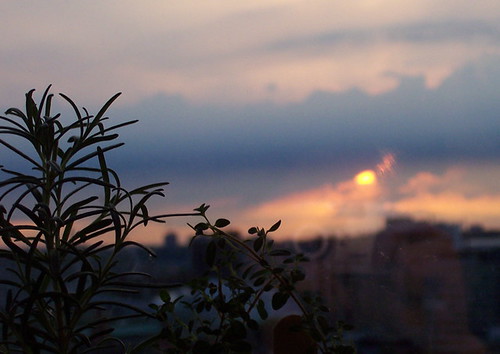
'Sustainable' is a word that gets bandied about a lot lately. Solar panels, bamboo tshirts, and laser-cut felt placemats are all touted as 'sustainable' choices, and while the term isn't misused as much as 'green' or 'eco-insert-adjective-here' there's still a lot of murkiness around what makes something sustainable (or not).
But sustainable is more than just low carbon emissions and a happy pig. It means a process, product or habit that can last, that we can continue doing and pass on to our children and grandchildren. From a shorter term outlook, it means habits and routines that we as individuals can keep doing, without burning through our money or energy reserves. Sustainable also means not racking up credit card dept or letting the dishes pile up in the sink, because like it or not eventually both of these things have to come to and end and so we do the dishes regularly and stick to a budget.
In my work life I'm sometimes a computer programmer. This is relevant because creating a sustainable life (which is really the whole topic of this post/ramble) is a little bit like software engineering: in both cases, you're trying to create something that can run on its own as long as it needs to, without using up too much memory or hard drive space in the process. And you want it to be robust as well, so you try and anticipate errors or unexpected outcomes and figure out ahead of time how to take care of them. You try to write code that is maintainable as well. This means that further down the line (looking ahead once again) whoever needs to change something, add a feature or fix a bug should be able to do so with a minimuam of fuss. (Even if it's only for yourself--two months later it's not always obvious what your own intentions were.) So you design your program in a way that makes sense, and you document it so that things are even clearer.
And its not just in programming or engineering that these kinds of considerations take place. Lawmakers, business owners, and managers of any group or organization (even one as humble as a single household) are trying, in the ideal case, to create sustainable processes. The details might differ (substantially) but the basic ideas are the same: efficiency, minimization of waste, robustness in the face of unexpected events, and maintainability and/or documentation.
None of this is easy. As a species, we have a tendency to concentrate on the short term, to make things work the best we can "for now" and apply band aid solutions when they (inevitably) stop working. So it's no wonder that our leaders seem to spend so much time squabbling over details. And it explains at least in part why something as simple as balancing a busy life is so difficult. The scale is different but the elements of the problem are the same. And on the largest scale, we are also trying to figure out the future of the world and the environment as a whole. Assuming we haven't killed ourselves off in the next hundred years, a sustainable society is the ultimate of long-term goals.
But back to the smaller scale again. I recently moved to a new city (again), and for the first time I plan on staying in one place and doing approximately the same thing for several years. So I've had an opportunity to think about sustainability from several angles. And I've found it comes up in a lot of things. It's in taking care of my apartment so that it's a place I'll enjoy coming home to again and again. Sustainability is also making sure that I take time for myself and not let my work become my whole life. Because if not, eventually I'll burn out and end up losing more than I put in. And on a broader scale I'm trying to reduce my impact on the environment and to live in such a way that I think we all could for a very long time. This last one is much more ambitious, and more difficult, and I'm not an expert and pretty certain I haven't got it right. But that's important too. It's a process of building habits and baby steps rather than wholesale changes or stringent limits. Because in the end the small changes are more lasting (i.e. sustainable), and isn't that the whole point?
Edit/addendum: I was going to make a point about this blog being like documentation so I know wtf I was thinking about, but I forgot to add it and now it doesn't really fit. Oh well, some other time.




No comments:
Post a Comment